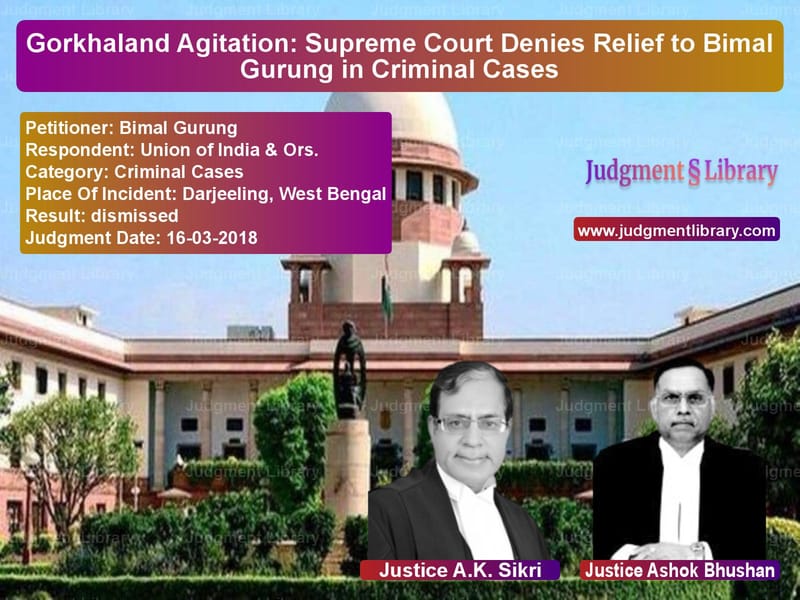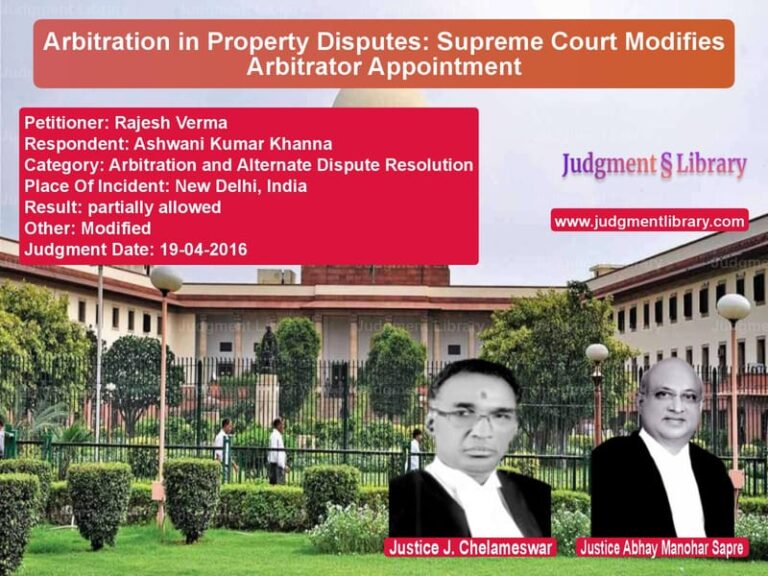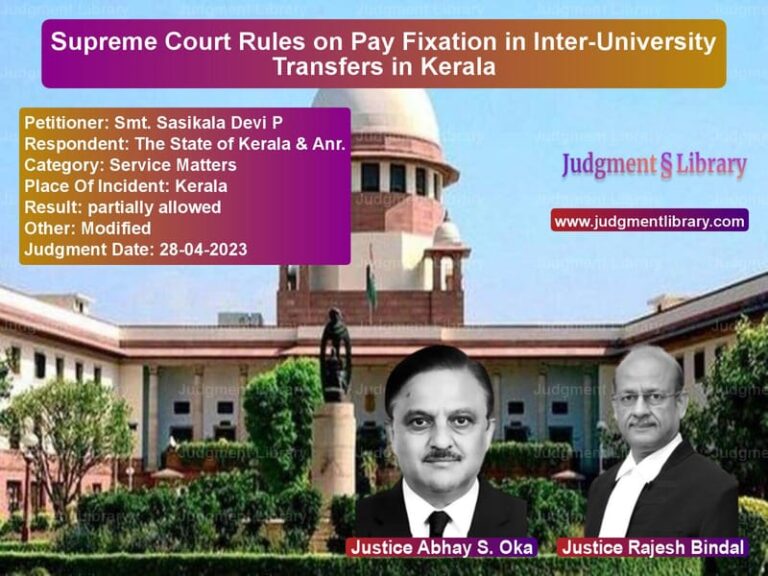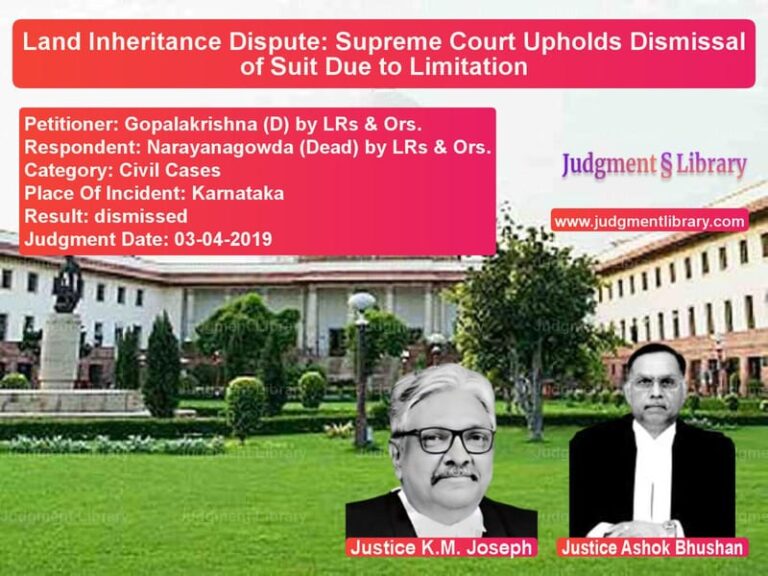Gorkhaland Agitation: Supreme Court Denies Relief to Bimal Gurung in Criminal Cases
The Supreme Court of India, in Bimal Gurung v. Union of India & Ors., addressed the legal and political implications of the Gorkhaland agitation in West Bengal. The case centered around multiple criminal charges against Bimal Gurung, leader of the Gorkha Janmukti Morcha (GJM), who sought relief from alleged political persecution by the West Bengal government.
Background of the Case
The petitioner, Bimal Gurung, was facing multiple criminal cases registered by the West Bengal police in connection with the Gorkhaland agitation. The movement, which sought a separate state for the Gorkha community, had led to violent protests, destruction of property, and clashes with law enforcement. Gurung approached the Supreme Court seeking protection from arrest and an independent investigation into the cases against him.
Key Events
- 2017: Gorkhaland agitation intensifies in West Bengal, leading to multiple clashes.
- Multiple FIRs registered against Bimal Gurung and other GJM leaders for rioting, arson, and incitement of violence.
- Gurung alleges political vendetta and seeks relief from the Supreme Court.
- West Bengal government opposes the plea, citing serious law and order concerns.
- Supreme Court delivers its verdict on March 16, 2018.
Legal Issues Before the Supreme Court
- Whether the criminal cases against Gurung were politically motivated.
- Whether an independent agency should investigate the allegations against him.
- Whether Gurung should be granted protection from arrest.
Arguments of the Parties
Petitioner’s (Bimal Gurung’s) Arguments
- The FIRs were filed as an act of political vengeance by the ruling party in West Bengal.
- The police were biased and acting on behalf of the state government.
- An independent probe was necessary to ensure a fair investigation.
- The right to protest is a fundamental right, and the cases were an attempt to suppress political dissent.
Respondent’s (Union of India & West Bengal Government’s) Arguments
- The Gorkhaland agitation had resulted in large-scale violence and loss of public property.
- Gurung was directly involved in inciting violence and should face legal proceedings.
- There was no political vendetta; the cases were registered based on evidence.
- Granting relief would set a dangerous precedent, encouraging political leaders to evade criminal liability.
Supreme Court’s Analysis and Judgment
The Supreme Court bench, comprising Justice A.K. Sikri and Justice Ashok Bhushan, carefully analyzed the case and found no merit in Gurung’s plea for an independent probe.
1. No Evidence of Political Vendetta
The Court ruled that Gurung had failed to provide substantial evidence that the cases against him were politically motivated:
“Mere allegations of political vendetta, without corroborative proof, cannot be grounds for an independent investigation.”
2. Right to Protest vs. Law and Order
The Court recognized the right to peaceful protest but distinguished it from violent agitation:
“While the right to protest is fundamental, it cannot extend to acts of violence, arson, and endangering public safety.”
3. No Interference in Ongoing Investigation
The Court refused to interfere in the state’s investigation, stating:
“Intervention in ongoing criminal proceedings is warranted only in cases of manifest injustice. No such case has been made out here.”
Final Judgment
The Supreme Court issued the following directives:
- The petition was dismissed, and no independent probe was ordered.
- Gurung was directed to cooperate with the investigation.
- The state was instructed to ensure a fair trial and avoid any politically motivated actions.
Impact of the Judgment
This ruling has significant implications for political protests and criminal investigations:
- Legal Accountability: Political leaders cannot claim immunity from criminal proceedings.
- Protection Against Abuse of Law: Courts will not entertain allegations of political vendetta without evidence.
- Balanced Approach: The judgment reinforces that protests must be peaceful and within legal limits.
Conclusion
The Supreme Court’s ruling in Bimal Gurung v. Union of India & Ors. sets a crucial precedent in balancing political rights with law enforcement. By denying relief to Gurung, the Court has emphasized the need for accountability while ensuring a fair legal process.
Petitioner Name: Bimal GurungRespondent Name: Union of India & Ors.Judgment By: Justice A.K. Sikri, Justice Ashok BhushanPlace Of Incident: Darjeeling, West BengalJudgment Date: 16-03-2018
Don’t miss out on the full details! Download the complete judgment in PDF format below and gain valuable insights instantly!
Download Judgment: Bimal Gurung vs Union of India & Ors Supreme Court of India Judgment Dated 16-03-2018.pdf
Direct Downlaod Judgment: Direct downlaod this Judgment
See all petitions in Bail and Anticipatory Bail
See all petitions in Terrorist Activities
See all petitions in Attempt to Murder Cases
See all petitions in Judgment by A.K. Sikri
See all petitions in Judgment by Ashok Bhushan
See all petitions in dismissed
See all petitions in supreme court of India judgments March 2018
See all petitions in 2018 judgments
See all posts in Criminal Cases Category
See all allowed petitions in Criminal Cases Category
See all Dismissed petitions in Criminal Cases Category
See all partially allowed petitions in Criminal Cases Category







